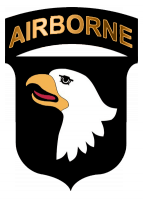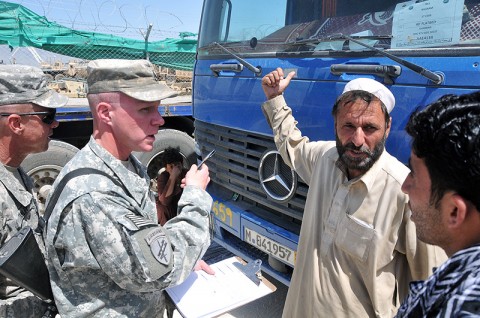Written by Sgt. 1st Class Pete Mayes
101st Sustainment Brigade, 101st Airborne Division (AA) Public Affairs

 Bagram Airfield, Afghanistan – Staff Sgt. Blake Adams and Sgt. Dennis Stanley’s background in law enforcement is proving vital to their mission to help combat corruption here in Afghanistan’s trucking industry.
Bagram Airfield, Afghanistan – Staff Sgt. Blake Adams and Sgt. Dennis Stanley’s background in law enforcement is proving vital to their mission to help combat corruption here in Afghanistan’s trucking industry.
The two are members of the 101st Sustainment Brigade’s Anti-Corruption interview teams which are working with the various Host Nation truckers to learn about the potential hazards they face on the roads in and around Regional Command’s East, North and Capitol.

The knowledge they receive from the truckers play a vital role in the brigade’s attempt to help stem the tide of corruption in Afghanistan that affect combat logistics, said Maj. Sean Gallagher, the brigade intelligence officer.
“We’re trying to improve the environment along the roads so that goods and services can be rendered free of enemy or criminal interdiction,” he said.
“Our focus is asking the drivers what they’re seeing on the roads, and where they’re seeing things, so that we can help target those places for our partner brigade combat teams to go out and reduce the enemy/criminal activity in that area.”
Corruption has long been an issue here in Afghanistan. It is not usual for host nation truckers to be the victims of ambushes and pilferage along their routes as they try to deliver supplies and cargo to their intended destinations.
Gallagher said the heart and soul of this mission is found in the brigade’s interview teams. The soldiers are paired with a linguist and go to the convoy staging yards both at BAF and Forward Operating Base Deh Dadi II to interview the drivers and gather information.
“As the get clues or responses, they follow up with questions about illegal checkpoints or where attacks have occurred, Gallagher said.
“We put the pieces of the puzzle together so that we can build a bigger picture. We can find the areas where it’s happening at. You interview 15-20 drivers, and 12 of them complain about the same area or checkpoint, and then you narrow it down to where it’s coming from, and the higher ups can address that at their level,” Stanley said.
This wasn’t the mission that Stanley initially was deployed to do. A trucker for the 109th Transportation Company, 17th Combat Sustainment Support Battalion, 101st Sustainment Brigade, his civilian background as a reserve police officer back in Dayton, Texas made him a viable candidate for the role.
“Brigade had sent down a request for soldiers who could assist with the interview team. My first sergeant knew of my background and selected me, and rather than driving the trucks, I ride along with them,” he said.
Adams, a transporter with the 919th Inland Cargo Transportation Company, 17th Combat Sustainment Support Battalion, 101st Sustainment Brigade, was a former active duty Military Police officer before switching to the Army Reserves. Echoing Stanley’s sentiments, he’s see the team as a means of helping the truckers taking care of their country’s issues.
“We’re going to leave eventually, and they’ll still be here. If they want this country to be better and safe, they really do need us to help fix their country. It’s got to start somewhere,” he said.
Both Stanley and Adams stress the partnership that has been formed with the truckers through the experience. “We’re able to get it first hand from them: ‘hey this is what we need,’ not just what we think they need,” Stanley said. “With us helping them out, in return they help us, and it builds a stronger partnership.”
“Not everybody over here is a terrorist,” Adams said. “They have families and they want to have money to take care of their families. They’re people like us too.”
“They want to make a living for their families. They just have a rough way of doing it,” Stanley said.


